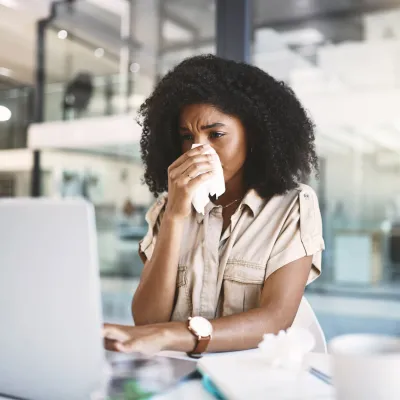- AdventHealth

Many of us have seen the heartbreaking effects of Alzheimer’s disease experienced by a friend or family member. Though much is still being discovered about how the disease develops and progresses and who is most at risk, getting enough sleep can help protect you.
We’re here to explain how you can get better sleep to help prevent Alzheimer’s and improve your whole health.
How Lack of Sleep Is Linked to Alzheimer’s
Alzheimer’s disease destroys brain cells that process, store and retrieve data resulting in loss of memory and other important mental functions. Beta-amyloid (a metabolic waste byproduct) builds up in your brain cells and forms plaque (a sticky deposit) that interferes with neuron communication. This plaque leads to the brain impairment we know as Alzheimer’s disease.
While you sleep, your body clears beta-amyloid from your brain. Sleep deficiency interferes with this natural process and can allow harmful buildup of beta-amyloid. Just one night of missed or poor sleep can show a noticeable increase in this byproduct, and more chronic sleep loss might cause a more harmful beta-amyloid accumulation.
Lack of Sleep Is Linked to Other Health Problems
Diet and exercise are essential to living a healthy life, but sleep is just as important. Not getting enough sleep — or getting poor quality sleep — can increase your risk for other long-term health problems, including:
-
Cognitive dysfunction (feeling “brain fog”)
-
Depression
-
Type II Diabetes
-
Stress
-
Weight gain
Other Ways Lack of Sleep Affects Your Body
Lack of sleep can affect your body in many ways, including:
-
Daytime drowsiness
-
Decreased hand-eye coordination
-
Depression
-
Increased anxiety
-
Micro sleeping (brief periods of sleeping while awake)
-
Slowed reflexes
Lack of sleep can also impair your reflexes and alertness, leading to more accidental injuries.
Tips to Improve Your Sleep
Some are fortunate enough to fall asleep as soon as their heads hit the pillow and sleep soundly through the night, while others struggle.
The good news is you can take control of your sleep health with some lifestyle changes throughout the day. In fact, the food and drinks you consume, the medications you take, your daily schedule and how you spend your evening hours all affect your quality of sleep.
The following tips may help you get a better night’s sleep for better long-term health:
-
Limit caffeine and large meals close to bedtime
-
Exercise during the day
-
Follow a consistent sleep schedule (go to bed at the same time each night)
-
Schedule your time to get at least seven hours of sleep
-
Go to bed when you feel sleepy (if not asleep in 20 minutes, get out of bed)
-
Keep your bedroom dark, relaxing, free of electronic devices and at a comfortable temperature
-
Limit fluid intake before bedtime
-
Wake at the same time each morning (even on weekends and holidays)
Here are some other sleep tips to help you get healthier rest at every age.
Be Confident in Your Safety at AdventHealth
There are many things that can affect your quality of sleep, but stress about getting the whole-health care you need doesn’t have to be one of them. If you are experience sleep disturbances or other health issues that you feel may be affecting your sleep, rest assured we are doing everything we can to make your care safe and convenient for you.
At AdventHealth, we’re taking the necessary precautions to protect your health, including:
-
Encouraging social distancing in all areas of our facilities
-
Requiring all staff, providers, patients and visitors to wear masks
-
Treating patients with coronavirus or coronavirus symptoms in different areas of the hospital
-
Taking temperatures and conducting COVID-19 screenings at all entrances to our facilities
-
Updating our visitor’s policy to keep everyone safe
If you or a loved one has trouble falling asleep, staying asleep or getting adequate sleep, it’s important to talk with your doctor about how this could affect your whole health. Most of our primary care providers are even available for virtual visits to help you get back on track with better sleep and overall wellness.



